Unique in Croatia: Pula Soon to Open ''Forest Kindergarten''
Children are full of an enviable amount of energy, and in the popular Istrian city of Pula, an idea that is totally unique in Croatia has come to the minds of those wanting to harness the mild climate and create what is being described as an outdoor, forest kindergarten.
As Poslovni Dnevnik writes on the 28th of December, 2018, grazed knees, muddy clothes, jumping around in ponds, climbing the trees, cold, rosy cheeks and smiling faces are everything that should be expected of a child, and Pula has come up with an innovative idea to harness childrens' curiosity for the outdoors, an idea entirely unique in Croatia.
As Glas Istre reports, the vision is that of a happy early childhood spent a unique ''forest kindergarten'' which is an idea that should come to life during springtime in Pula. The conceptual initiator of this unique idea is psychologist and certified nanny Francesca Miličević, who is herself a mother of a two-year-old child.
When asked how she came to the idea of opening a kindergarten where most of the time children would stay outside, she said that she had observed how it's done in Scandinavian countries, and that she united various pedagogical systems, as well as permaculture, ecology, and of course, spirituality.
''The Kindergarten is being created in cooperation with the Heartface association and another specialist organisation, and the process of leasing a part of the forest at Veli vrh from Croatian Forests (Hrvatske Šume) is already underway,'' stated Milićević, explaining that this kindergarten will receive children from ages threee to six, and the idea is unique in Croatia as it will differ from the classic type of kindergarten in that the emphasis will be placed primarily on the children spending more time out in the open, enjoying nature, regardless of the weather conditions.
''We're blessed with the climate, it's the end of December, and outside there is beautiful sunshine. These kind of kindergartens are common in countries where the winter is extremely cold, so getting too cold isn't something that really needs to be feared. Indeed, scientific research proves that children who spend more time outdoors, in the fresh air, are healthier than those who spend more time in confined spaces,'' says the kickstarter of this kindergarten which will be one of a kind, and unique in Croatia.
Make sure to follow our dedicated lifestyle page for much more.
Croatian Demographic Picture: Cash for Birth in Least Populated Municipality
There can be no denying that Croatia's overall demographic picture is grim. An astonishing amount of people have left, mainly since the country's accession to the European Union, when borders ''opened'' and life was made easier for those seeking opportunities abroad, but also since before then. With an enormous number of Croats having fled the country, mainly from the overlooked continental and eastern areas, the already poor Croatian demographic picture is growing more and more bleak.
As Poslovni Dnevnik writes on the 13th of December, 2018, over the last six or seven years, all the first graders from the entire territory of the Levanjska Varoš municipality, with its 136 square kilometres, in which there are just nine settlements, will sit behind just three school desks, according to a depressing report on Croatia's continually worsening demographic crisis by Glas Slavonije.
The small number of children born in this part of Osijek-Baranja County this year offers no hope for this municipality, at least at the moment, and with very little room for optimism in expectations of its demographic recovery, other measures are being sought.
Cash for every birth is an incentive for many, as the aforementioned area is one of the least populated areas, the first association of which is one of poor development, a small population, and one of the areas in the whole of the Republic of Croatia which is the most in need.
In Levanjska Varoš, there are currently less than 6.9 inhabitants per square kilometre. The last census, which was carried out back in 2011, stated that there are 1,250 inhabitants, but, according to the mayor Slavko Tidlačka, for a long time now there have been less than 1,000, about 950 people who live in one of the nine settlements.
Like the poor Croatian demographic picture in general, the prospects for many local villages in this area, as well as across the country as a whole, with a little more ''leg room'' in some areas, are still extremely bad.
Until recently, this municipality has been awarding parents a sum of 1,000 kuna for each newborn child, but now that amount has been significantly boosted. Last year's decision on the right to financial compensation for newborn children in the area was passed. According to the details of that move, parents are paid 2,000 kuna for their first and second child, 5,000 kuna for a third, and for the fourth and then every next child, as much as 10,000 kuna.
Make sure to follow our lifestyle page for more information on the poor demographic image in Croatia and much more.
New Project to Help Kids with Developmental Disabilities in Croatia
As SibenikIN writes on the 30th of November, 2018, a project which brings together animals and children in the name of helping kids with varying disabilities, worth a massive million and a half kuna, will seek to help as many as twenty kids with numerous developmental disabilities in Croatia.
This project is not only a praiseworthy but an interesting one because it directly involves working with children with various developmental disabilities, these children tend to do very well once they get involved in athletic activities, and the emphasis this time, is on horses.
''The children will learn how to ride a horse, as well as how to properly groom and care for a horse in preparation for riding. We're proud because the project will go on for three years and we're expecting at least twenty children to be included in it,'' said Suzana Živković of the Kolan riding association.
It has been proven on numerous occasions that therapeutic riding has quite a few effects on the overall health of children and young people.
''Improvements in both the motor and emotional fields are seen in all children. The children are given freedom, they gain self-confidence, their social communication is strengthened, and being around nature is an incentive to a healthy life,'' noted Suzana Živković.
The Kolan riding association was established back in 2012 and currently has 48 members, including both recreational riders and children with various disabilities.
There are currently twelve horses who live permanently on the farm, four of which are ''therapeutic'' horses, and the remaining horses are ridden for recreational purposes. The breeds present at the riding club include Icelandic horses and various types of mixed breeds.
This wonderful project aimed at helping kids with developmental disabilities in Croatia is funded by European Union funds, as well as funds from the Ministry of Family and Demography and it will, as previously mentioned, last for three years, the project's partners are the City of Šibenik and the Šubićevac Education Centre.
Make sure to follow our lifestyle page for more.
Stem Revolution for Croatian Schools: Programming with Micro:Bits
The stem revolution for Croatian schools has begun for children in grades 1-4!
Zagreb, November 6, 2018 - Elementary schools across the whole of Croatia as can apply for participation in the new STEM Revolution – Grades 1- 4 project. Those participating will have the opportunity to teach their youngest pupils digital literacy competencies and learn programming using micro:bits.
The project was presented by Nenad Bakic, the President of the Institute for Youth Development and Innovation (IRIM). During the last year, project STEM revolution introduced programming into the wider education system, with a donation of 25,000 micro:bit microcomputers into 1000 institutions.
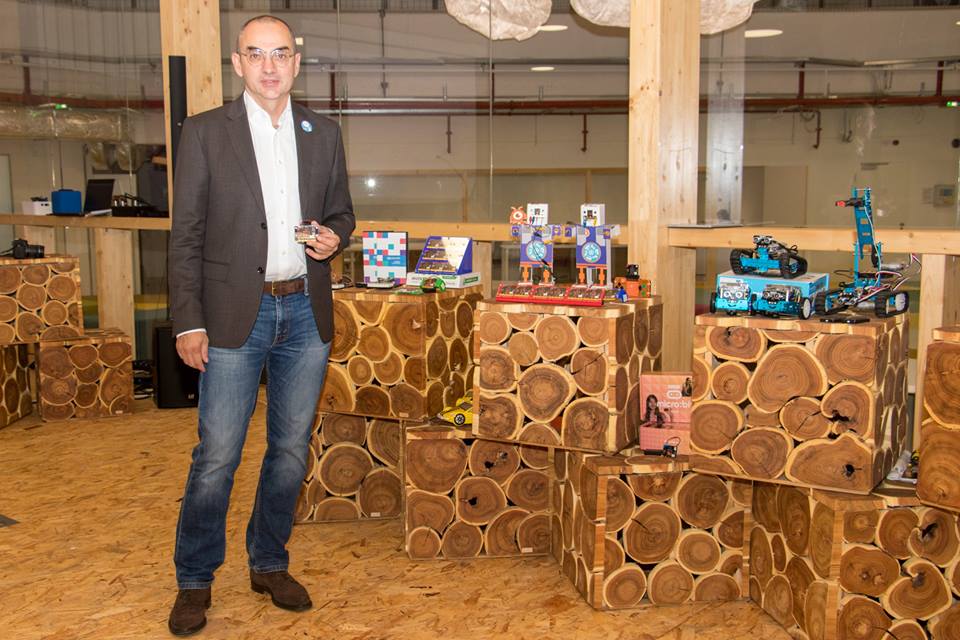
In cooperation with the Ministry of Science and Education, the Croatian Employers Association, CARNet and other partners through the ProMikro project IRIM, programming in the 6th grade with over 35,000 donated micro:bits was introducted, was well as content development and education of over 2000 teachers.
''There is a strong interest in Croatian educational system for the introduction of STEM competencies, especially in relation to technology. This can be seen in advanced activities, for example, through the ever-growing interest in the Croatian Makers Robotics League, which now includes over 550 educational institutions, but equally at the widest level of digital competence development, i.e. programming and the development of digital literacy, through STEM Revolution projects and ProMikro. As a follow up to these projects, research conducted among school principals and teachers shows a great interest in expanding these activities,'' Nenad Bakic said at the presentation of the project which will be implemented in cooperation with Rotary Club Zagreb Center and Rotary District 1913 – Croatia.

There are currently approximately 2000 schools in Croatia which have pupils in grades 1 - 4, and all will be invited to voluntarily participate in the project. Expectations are that approximately half of the schools will apply, taking into account the interest of the school and the teachers, as well as the availability of other equipment such as computers, tablets, or smartphones, which are used to program micro:bits.
Programming will be introduced for a particular subject and also across the spectrum of school subjects. Micro:bit is a teaching tool for delivering existing content in a digitally creative way so there is no need to change the curriculum.
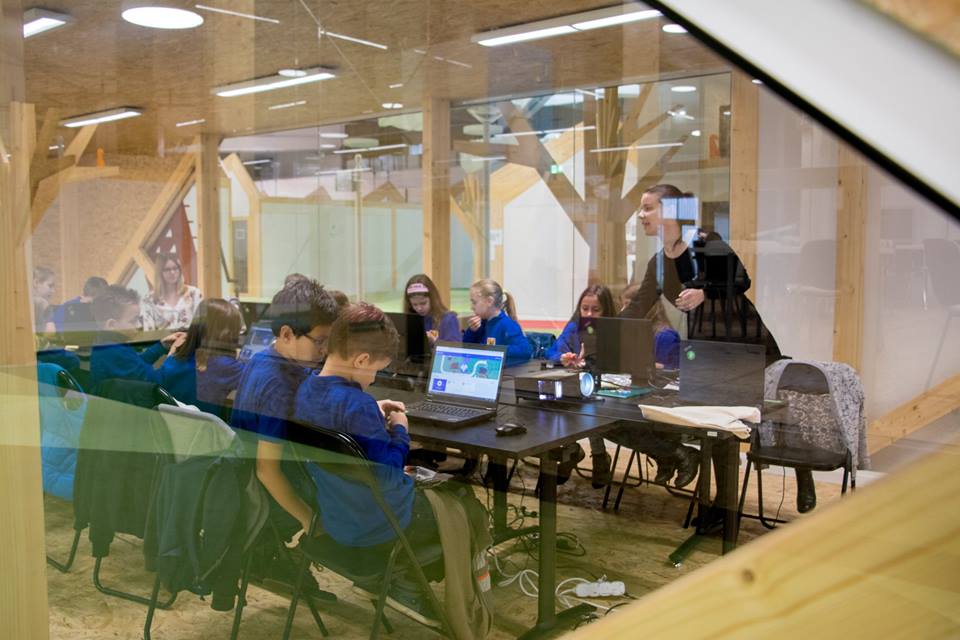
After the national STEM project, the micro:bit has established itself as a globally unique and leading computing platform, with national projects, for example in Denmark (for all 5th grade students, to introduce programming), Singapore and Canada.
As lower grade students rarely have a designated time to use computer labs, micro:bits will be placed in school libraries. In this way, teaching can take place in the library and in the classrooms. The library will allocate additional micro:bits for students to borrow for work at home, Bakic announced.
The project cost is estimated at 5 to 6 million kuna, and initial funding will be provided by IRIM and the Rotary Club Zagreb Center, each with 100,000 kuna, which will secure the purchase of the first micro:bits.

The project will be implemented for a period of 12 or 24 months, depending on the availability of funds and interest of the schools. It is possible to finance it in phases, so schools will receive micro:bits in waves, in the order that have signed up.
IRIM will also fund the development of content for lessons from various subjects, using micro-bits, just as it did for the 6th and 5th grade. Content will be permanently available and upgraded using various channels. IRIM will also educate 1000 - 3000 teachers, just like it previously trained two thousand teachers for the ProMikro project.
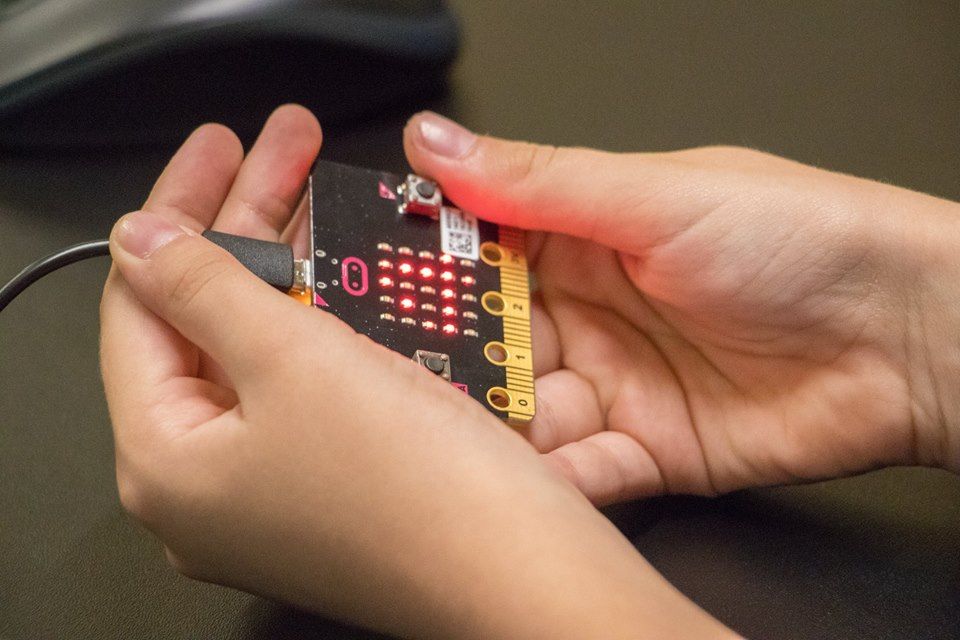
IRIM also provides web site production, collection of applications and communication with schools. Partner organisations joining are: the Croatian Post Office, which will donate the delivery of micro:bits throughout the country, the Bruketa & Žinić & Gray creative agency will supply its services in the project presentation, and the PR agency Communication Laboratory will give support for public relations. BBC micro:bit is an educational and creative tool whose purpose is to inspire a new generation of young people.
It can be used in a variety of ways throughout the curriculum, not just in STEM subjects (science, technology, engineering and mathematics). It can help young people acquire knowledge and skills to develop from digital technology consumers into designers and creators of new tools that will help them improve their learning, solve problems or simply entertain them and allow them to take full advantage of the benefits of life and economy in the 21st century.

Micro:bit is characterised by extremely low prices, low barriers for beginner and advanced use, and a highly rich ecosystem. Click here and here for examples.
The founders of the Micro Foundation are: the BBC, Microsoft, Amazon, Samsung, ARM, the British Council and others.
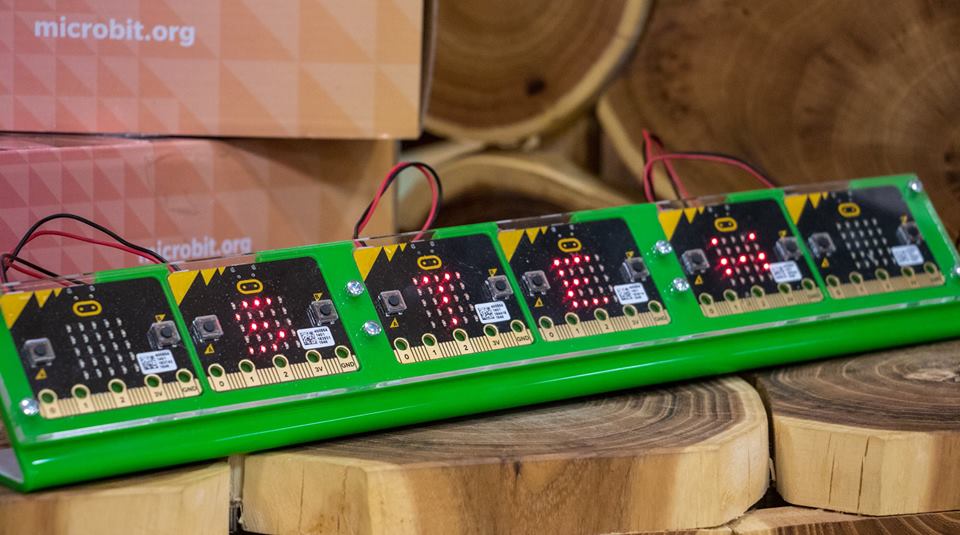
IRIM runs the Croatian Makers program, which includes a number of projects such as: the Croatian Makers Robotics League, STEM Revolution, ProMikro, Internet of Things, STEM Revolution continues - Libraries, STEM Car. Croatian Makers, with over 100,000 children, and over 3,000 educated teachers, is the largest program of its kind in the EU.
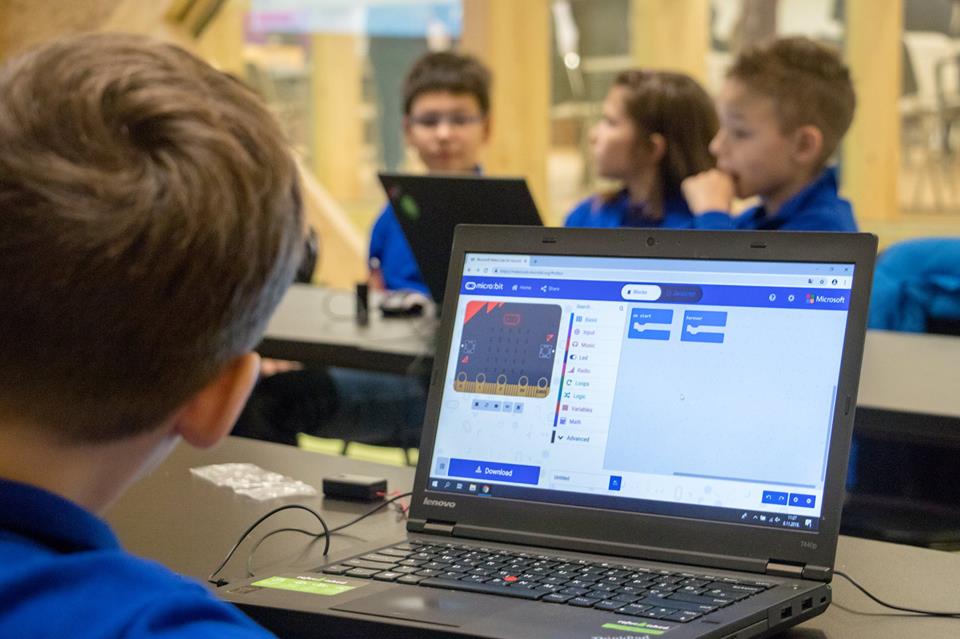
The founders of IRIM are Nenad and Rujana Bakic. You can find more information on Croatian Makers here. Participating schools can apply here.
Want to keep up with more information on the stem revolution in Croatian schools and more information like this? Make sure to follow our Made in Croatia page!
PBZ Donations Help Čakovec County Hospital Continue Praiseworthy Mission
With this project, PBZ Group collected more than 14 million kuna and realised 36 donations.
Cammeo Taxi Offers to Drive First Graders on First Day of School for Free
A praiseworthy initiative from Cammeo.
Šibenik's 58th International Children's Festival Open!
Šibenik is the place to be for the youngest members of our families!
Six Days Til Šibenik's 58th International Children's Festival!
Šibenik is preparing for the 58th MDF!
Children's Hospital Project: Unfinished University Hospital Becomes "New Klaićeva"
Will a praiseworthy new project in an unfinished building in the capital be realised?
Students' Perspective: Kućanci School, Slavonia - Three Brothers and One Teacher
We often hear a lot from the government when it comes to emigration, particularly from Slavonia, we're sometimes lucky enough to hear from the teachers, but when do we ever truly hear from those it affects most?

